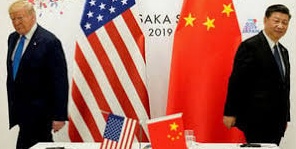Business News of Thursday, 24 April 2025
Source: www.ghanawebbers.com
Will Trump unite China and Europe?
In recent trade developments, Trump imposed a 50% tariff on China. This was in addition to two previous 10% tariffs from February and March. He also added a 34% “reciprocal” tariff on his “Liberation Day,” which he later raised to 84%.
As a result, the minimum tariff rate on Chinese goods is now 145%. There is a temporary reprieve for consumer electronics. China retaliated with matching tariffs, raising the overall tariff on US imports to 125%.
The Trump administration believes that China cannot handle these economic losses. Exports account for nearly 20% of China's GDP. About 14.7% of its exports go to the United States, its second-largest market.
A 145% tariff will heavily impact Chinese firms and families. This comes at a time when China's economy is struggling. However, Trump's aggressive tariffs may have given China a political advantage.
Many ordinary Chinese may blame their economic pain on "US bullying." The Chinese government emphasizes the mutual benefits of trade and calls for national unity. As America behaves less reasonably, domestic support for the Chinese government may increase.
China is not isolated in this situation. While Biden's administration tried to isolate China, Trump's actions have united it with traditional US allies. For instance, he raised tariffs on EU imports by 20%, prompting retaliatory measures from Europe.
America's focus on China might aim to realign Europe against it but has created challenges too. Mexico has offered to match US tariffs on China already. However, much damage has been done to US interests.
Even if the EU negotiates successfully with the US, tensions over Ukraine and Greenland remain problematic. These issues could permanently affect European trust in America as an ally.
Frustration with the US won't automatically make Europe align with China either. The EU has many complaints about China's practices, especially regarding electric vehicles and support for Russia in Ukraine.
Trump's policies have made trade with the US more expensive and unpredictable for everyone involved. This creates an incentive for Europe to strengthen ties with China instead.
Despite withdrawing from the Paris climate agreement, both Europe and China recognize urgent action against climate change is needed. They lead in electric vehicle manufacturing and green energy technologies.
The war in Ukraine complicates matters but may motivate cooperation between Europe and China as they seek stability against American unpredictability.
Possible agreements could involve increased Chinese imports from Europe or limits on exports to Europe. Additionally, sharing technology could benefit both sides' industries like AI and electric vehicles.
This would turn perceived unfair advantages into benefits for European producers and consumers alike. In return, Europe could promote greater Chinese participation in global decision-making processes.
While unlikely to abandon Russia completely, China can still show goodwill towards Europeans by increasing imports of Ukrainian foodstuffs or supporting Ukrainian refugees.
Recent diplomatic visits indicate that cooperation between Spain and China is growing stronger as well as planned meetings between Xi Jinping and EU leaders this July.
If successful, this cooperation might turn what seems like an economic crisis into a geopolitical opportunity for both countries.











